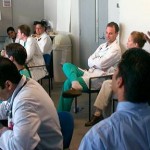Transformation of Medical Education urged Among Poor Countries
A new study points out to the pressing need of a transformation of medical education among poor countries. Low and middle income countries are experiencing scarcity of trained and equipped medical doctors. As part of a critical health issue within these countries, there is a need to increase the number of doctors in these countries. The sub-Saharan region in Africa has 24% of all burden of global disease but ironically the region only has 3% of the world’s medical workers.
Aside from increasing the number of medical and health practitioners, there is a great need to upgrade the medical education among many low and middle income countries. For every 100,000 individuals, there are about 270 doctors in the United States, 210 in the United Kingdom and 170 in Brazil. But sad to note that there are only about 2.3 in the African country of Tanzania while 1.1 in Malawi.
In all 47 countries comprising the sub-Saharan region in Africa, there are about 168 schools offering medical courses and producing 9,000 to 10,000 graduates with medical background per year. Increasing the students and eventually the graduates will not in any way solve the worsening medical problems relating to the health workforce.
There are many health workforce problems plaguing many countries globally including insufficient health education, imbalance between rural and urban poor populations, poor match of medical education versus the evolving health problems, and challenges of providing doctors in communities where they are needed the most. The solution to improve and transform the health condition of the society in a global perspective is not only to increase the quantity but to give more attention to quality of doctors produced per year.
